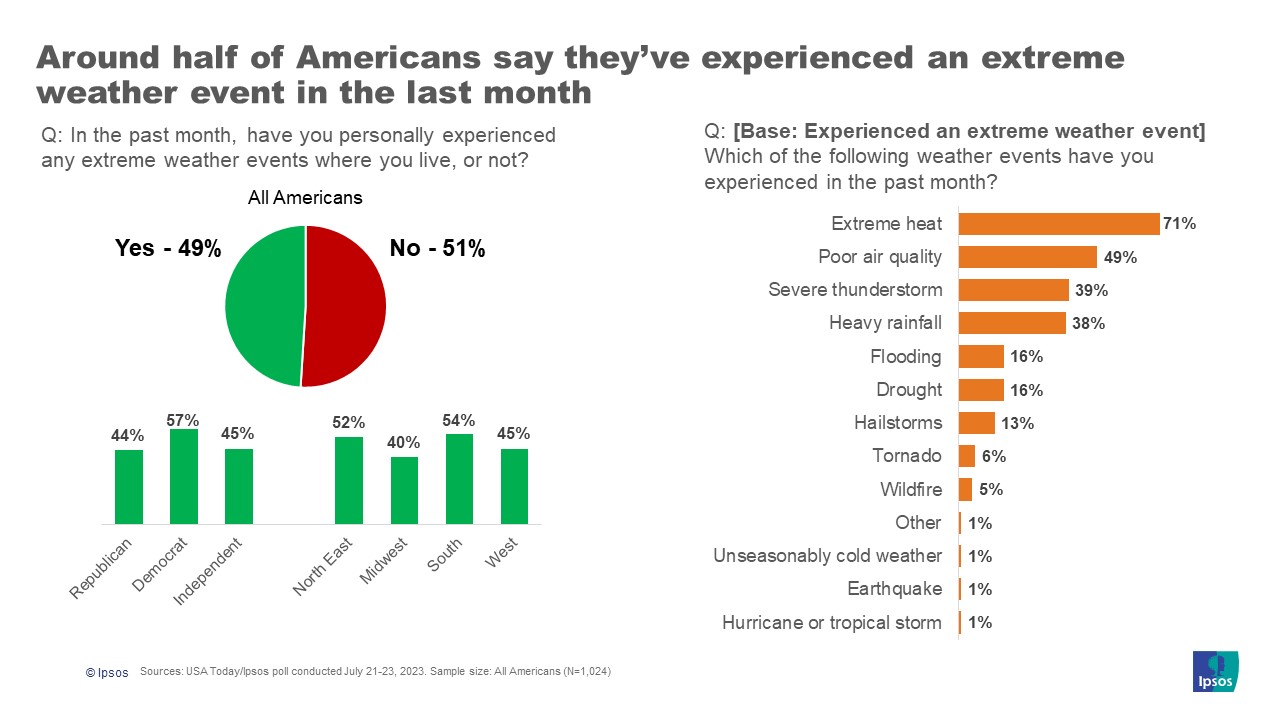One in four Americans say climate change will make it harder to live in their area
September 6, 2023, Washington DC— Following a summer filled with intense weather events from Alaska to Hawaii, most Americans say they have experienced some form of extreme weather in the past month, with extreme heat getting cited the most, according to a new USA Today/Ipsos poll on extreme weather. Additionally, a majority of respondents say that compared to 10 years ago, poor air quality or air pollution is getting more frequent or intense in the communities they live, up significantly from April 2023. Perhaps because of the wide-reaching experience with extreme weather this summer, about one in four Americans say climate change will make it more difficult to live in their area, and most expect extreme weather to continue in the future.
Notably, partisanship colors Americans’ experience with extreme weather and their views on climate change overall, with more Democrats reporting experiences with extreme weather and belief in the adverse effects of climate change than Republicans.
Read the story in USA Today here.

Detailed findings:
- Many Americans report experiencing extreme weather events recently. While there is slight variation by region, the bigger difference is partisanship: Democrats are more likely than Republicans to report experiencing extreme weather.
- Half (49%) note they have personally experienced extreme weather events in the past month. Democrats (57%) are more likely to say they have experienced recent extreme weather than Republicans (44%) or independents (45%). Respondents in the Northeast (52%) and South (54%) are also more likely than those in the Midwest (40%) to report experiencing extreme weather.
- When it comes to what people have experienced, extreme heat (71%) tops the list, followed by poor air quality (49%), then severe thunderstorm (39%) and heavy rainfall (38%). Respondents from the West (90%) and South (82%) were more likely to report experiencing extreme heat compared to respondents from the Northeast (45%) or Midwest (47%), while respondents from the Northeast (63%) were the most likely to report heavy rainfall compared to respondents from the Midwest (49%), South (36%) or West (15%).
- After a summer where smoke from the Canadian wildfires blanketed much of the country, three in five Americans (61%) Americans report that poor air quality and air pollution have gotten more frequent and intense where they live compared to 10 years ago, up from 43% who reported the same in April 2023.
- Democrats (70%) are more likely than Republicans (54%) to say poor air quality and air pollution has become more frequent where they live, as are people in the Northeast (81%) and Midwest (77%) compared to those in the South (48%) and West (54%).
- Most Americans believe extreme weather will become more frequent in the near future, with some even feeling it will be difficult to stay in their homes and communities due to climate change.
- More than two in three Americans (68%) agree extreme weather events will become more frequent in the near future.
- About one in four (23%) say it will get more difficult to stay in the area they currently live in due to climate change. Again, we see a significant partisan divide on the perceived effects of climate change, as Democrats are nearly three times more likely than Republicans to feel this way (31% vs. 13%).
- Will the Midwest see an influx of “climate migration?” More people in the West (30%), South (24%), and Northeast (22%) agree it will get harder to stay in their area than those in the Midwest (13%).
- Most Americans (63%) feel that humans can slow or reverse climate change but aren’t willing to change their behavior.
- Two in five Americans (39%) feel that climate change is negatively affecting their everyday life. Partisanship colors these opinions – a majority of Democrats (57%) and a minority of Republicans (19%) feel the same way.
- Climate change divides the country along party lines.
- A majority of Americans (55%) feel that climate change is mostly caused by human activity, up from April 2023, when 49% of Americans agreed. However, more Democrats (82%) and independents (56%) than Republicans (28%) agree with this.
- Instead, more Republicans (39%) than Democrats (8%) or independents (21%) feel that climate change is mostly caused by natural patterns or feel climate change is not really happening (11% among Republicans vs. 4% among independents and with no Democrats agreeing).
- Unsurprisingly, these views on climate change’s origins translate into concern about climate change, with more Democrats (91%) and independents (71%) than Republicans (45%) being concerned about climate change.
- Overall, 55% of Americans say that over the past few years, they’ve grown significantly or somewhat more concerned about the effects of climate change, with Democrats (77%) and independents (52%) driving this change rather than Republicans (33%).
About the Study
This USA Today/Ipsos poll was conducted July 21-23, by Ipsos using the probability-based KnowledgePanel®. This poll is based on a nationally representative probability sample of 1,024 general population adults age 18 or older, including 263 Republican respondents, 323 Democrat respondents, and 309 independent respondents.
The margin of sampling error for this study is plus or minus 3.3 percentage points at the 95% confidence level, for results based on the entire sample of adults. The margin of sampling error takes into account the design effect, which was 1.14 for all respondents. The margin of sampling error for this study is plus or minus 6.4 percentage points at the 95% confidence level, for results based on the sample of Republican adults. The margin of sampling error takes into account the design effect, which was 1.14 for Republicans. The margin of sampling error for this study is plus or minus 5.9 percentage points at the 95% confidence level, for results based on the sample of Democrat respondents. The margin of sampling error takes into account the design effect, which was 1.15 for Democrats. The margin of sampling error for this study is plus or minus 6.0 percentage points at the 95% confidence level, for results based on the sample of independent respondents. The margin of sampling error takes into account the design effect, which was 1.16 for independents.
In our reporting of the findings, percentage points are rounded off to the nearest whole number. As a result, percentages in a given table column may total slightly higher or lower than 100%. In questions that permit multiple responses, columns may total substantially more than 100%, depending on the number of different responses offered by each respondent.
The survey was conducted using KnowledgePanel, the largest and most well-established online probability-based panel that is representative of the adult US population. Our recruitment process employs a scientifically developed addressed-based sampling methodology using the latest Delivery Sequence File of the USPS – a database with full coverage of all delivery points in the US. Households invited to join the panel are randomly selected from all available households in the U.S. Persons in the sampled households are invited to join and participate in the panel. Those selected who do not already have internet access are provided a tablet and internet connection at no cost to the panel member. Those who join the panel and who are selected to participate in a survey are sent a unique password-protected log-in used to complete surveys online. As a result of our recruitment and sampling methodologies, samples from KnowledgePanel cover all households regardless of their phone or internet status and findings can be reported with a margin of sampling error and projected to the general population.
The data for the total sample were weighted to adjust for gender by age, race/ethnicity, education, Census region, metropolitan status, household income and party identification. The demographic benchmarks came from the 2022 March Supplement of the Current Population Survey (CPS). Party ID benchmarks are from recent ABC News/Washington Post telephone polls. The weighting categories were as follows:
- Gender (Male, Female) by Age (18–29, 30–44, 45-59 and 60+)
- Race/Hispanic Ethnicity (White Non-Hispanic, Black Non-Hispanic, Other, Non-Hispanic, Hispanic, 2+ Races, Non-Hispanic)
- Education (Less than High School, High School, Some College, Bachelor or higher)
- Census Region (Northeast, Midwest, South, West)
- Metropolitan status (Metro, non-Metro)
- Household Income (Under $25,000, $25,000-$49,999, $50,000-$74,999, $75,000-$99,999, $100,000-$149,999, $150,000+)
- Party ID (Democrat, Republican, Independent, Something else)
For more information on this news release, please contact:
Mallory Newall
Vice President, US
Public Affairs
+1 202 374-2613
[email protected]
About Ipsos
Ipsos is one of the largest market research and polling companies globally, operating in 90 markets and employing over 18,000 people.
Our passionately curious research professionals, analysts and scientists have built unique multi-specialist capabilities that provide true understanding and powerful insights into the actions, opinions and motivations of citizens, consumers, patients, customers or employees. Our 75 solutions are based on primary data from our surveys, social media monitoring, and qualitative or observational techniques.
Our tagline "Game Changers" sums up our ambition to help our 5,000 customers move confidently through a rapidly changing world.
Founded in France in 1975, Ipsos has been listed on the Euronext Paris since July 1, 1999. The company is part of the SBF 120 and Mid-60 indices and is eligible for the Deferred Settlement Service (SRD).ISIN code FR0000073298, Reuters ISOS.PA, Bloomberg IPS:FP www.ipsos.com



